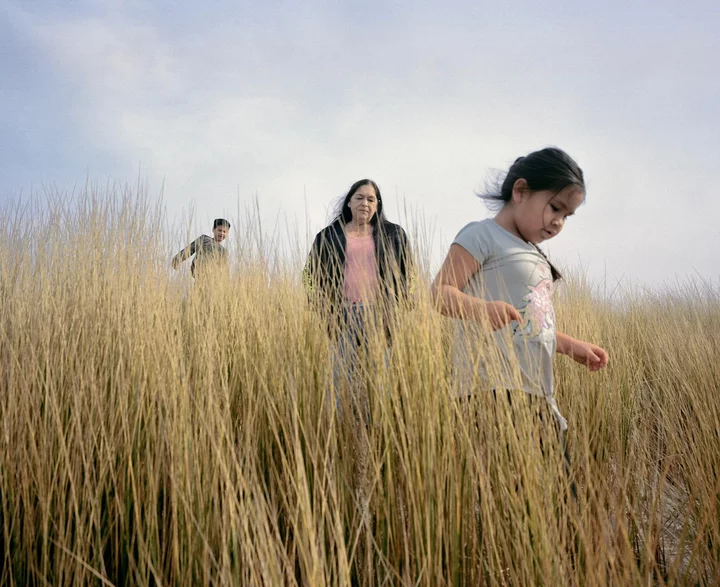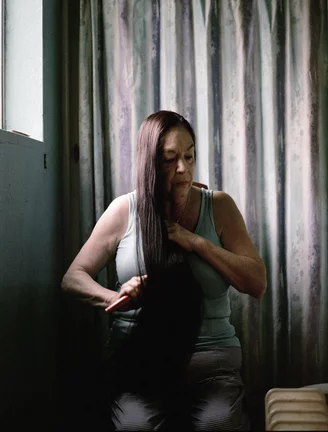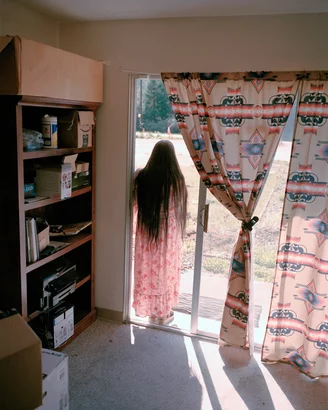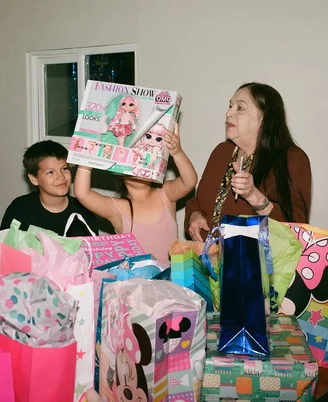Judith “Judy” Surber pictured with two of her grandchildren. All photos by Justin Maxon, used with permission.
###
For nearly two decades, Judith “Judy” Surber has witnessed the devastating impact of the opioid crisis on the Hoopa Valley Indian Reservation.
As the manager of the Ki’ma:w Medical Center’s medication-assisted treatment (MAT) program, Surber has seen her community grapple with the insidious grip of opioid addiction, an affliction that began with the introduction of OxyContin in the mid-2000s and has since progressed to rampant use of fentanyl. Members of her own family were no exception, with her husband, two of her children and even her teenage grandaughter falling victim to opioids.
Earlier this year, Surber collaborated with Justin Maxon, an internationally recognized local photographer and lecturer at Cal Poly Humboldt, to tell her story in a New York Times opinion piece, “Addiction Ravaged My Family and Tribe. I’m Fighting to Get Them Back.” That story was recently selected as one of the best stories of the year by the Pulitzer Center, which provided a chunk of grant funding for the project.
“It was actually a big surprise,” Surber told the Outpost in a recent phone interview. “I don’t know why, but I looked online for something and [an email] popped up. I kind of breezed through it, and then I looked again and saw that [my story] was picked as one of the top stories of 2023 that their staff picks every year. … I was ecstatic.”
Surber has written about opioid addiction in the Hoopa Valley for a number of years. Her first book, Reservation High, a work of realistic fiction, tells the story of a young woman’s journey through addiction and, eventually, recovery.
“I wanted a character that people would like so much that they could feel empathy for her, despite her addiction,” Surber said. “I think I did a good job at it because anybody who read it at that time would say, ‘Wow, I didn’t know that that’s what my sister or my brother was going through and now I see what they’re dealing with every day.’ So in that sense, it did its job.”
When she wrote Reservation High “things were really bad,” Surber said. Her husband, who died in 2019, and her two sons, Roger and Cory, were struggling with opioid addiction. During that time, she “lost jewelry, cameras and anything else that could be traded or hocked” for OxyContin or heroin. “Our lives became a series of crises that quickly became our norm,” she wrote. “We lived in survival mode.”
Years later in 2022, her teenage granddaughter overdosed three times on fentanyl. “I fought hard to get her into a treatment center with a Native program but was turned away by two Indian Health Service youth residential treatment centers, which said that she needed a higher level of care,” Surber wrote. In my heart, I knew that the next overdose might be her last.”
Despite her family’s ongoing struggle, Surber said she “never bought into the idea of tough love” as a means of helping another person – let alone her own children – overcome addiction. Instead, she is a proponent of unconditional love.
“I tried tough love – it didn’t work,” she said. “I’ve had better success by just loving my kids unconditionally. There are ways that you can love them and still support them without supporting the addiction. I want them – I want everyone – to know that recovery is there, but also that relapse can happen. We need to normalize that and take the shame out of it because it is a part of the growth process. If someone relapses, we need to help them get right back on the wagon and on their way to recovery.”
One of Surber’s main objectives in her work with the Ki’ma:w Medical Center and as a storyteller is to reduce the stigma that surrounds addiction.
“I look at it as a medical issue, not as a moral failing, not as a character flaw,” she said. “We want to blame people and not look at it as a disease. I’ve never used drugs in my life, yet I get beat up by a lot of people over my grown son’s addiction as though I’ve done something wrong that has caused his addiction. If my child developed cancer or diabetes, they wouldn’t look at me and say ‘Oh, the mother or father caused [it].’ We always want to blame somebody else when it comes to addiction.”
Similarly, Maxon uses his camera to portray “people as full human beings” rather than reducing their lived experience to their addiction. He intentionally photographed Surber, a dear friend of his, and her family with the “hope that people can relate and connect more with their story.”
“The way that mainstream media has covered the opioid crisis … is usually very hyperbolic and it often blames the victim,” he said. “When you photograph people in these very difficult positions without showing the full range of their human experience it’s like almost saying, ‘Look at these people! Look what they’ve done to their lives!’ … A huge percentage of [the coverage] is either a needle in the arm or an overdose or a drug arrest. There’s no nuance to the conversation.”
Maxon grew up here in Humboldt, splitting his time between his father’s home in Hoopa and his mother’s in Eureka. When he became addicted to opioids as a teenager, his stepfather “tried the tough love approach” and wanted to kick him out of the house if he didn’t stay clean, but his mother opted for a different strategy.
“My mom said, ‘No, we have to embrace him and we need to find some solutions that will work for him.’ And that worked,” Maxon said. “If you kick your child out of the house, you no longer have any influence over what happens to them. You know they won’t be coming home at night to a safe place.”
Maxon first connected with Surber in 2018 while working on a story about her husband and brother-in-law for the Washington Post. “I felt an instant kinship with Judy,” he said. “When we first met, there was so much stigma swirling around both of our lived experiences and we had no judgment toward each other. I honestly felt like I could be myself around her, and that’s a rare thing to have with a person. She’s like family to me.”
Since her story was published in November, Surber has received messages of praise and support from all around the world.
“I’ve gotten messages from all over the United States, as well as France, Greece, and a lot of indigenous sisters in Canada have been offering the support,” she said. “Some [of the messages] are from people who are working in the field who’ve said, ‘I never looked at addiction like that. This has made me rethink all my negativity towards it.’ Nobody has written to me about anything except extremely positive stuff.”
When asked how her sons are doing, Surber said her son Roger has been clean for four months, but he and his wife are struggling to find housing in the area. Her son Cory continues to struggle with addiction.
“My other son lives between Santa Rosa and the Tenderloin [in San Francisco]. He’s living on the street,” she said, her voice wavering with emotion. “He just doesn’t see himself being able to get clean – he thinks it’s beyond him. He thinks he is too far gone even though he has seen his brother doing it. … I just keep praying and offering help and ways to support him. It’s really hard to watch. I have a lot of sleepless nights, truthfully.”
As described in her story, Surber is still fighting to regain custody of her grandchildren, who were taken out of her home and put into foster care in Crescent City after their parents lost custody of them earlier this year.
“I haven’t done anything wrong and the kids have always been very safe and protected with me,” she said. “I drive up to see them every two weeks. It’ll be one year since they were taken and I never thought it would go to this extreme.”
Surber is going to sign a contract with a New York City-based publishing company in the coming weeks in anticipation of her next book, The Broken Ones. She and Maxon are hoping to collaborate on a similar project in the near future.
You can find the full text of Surber’s opinion piece and more of Maxon’s photos at this link.




CLICK TO MANAGE